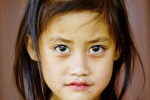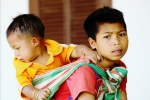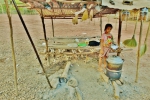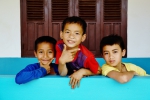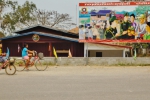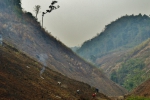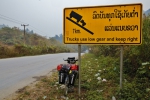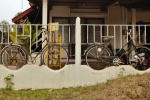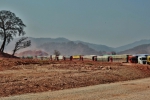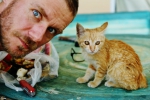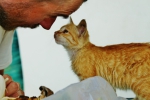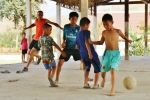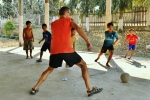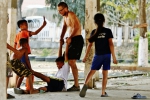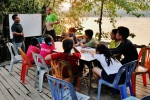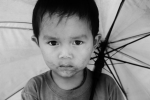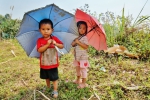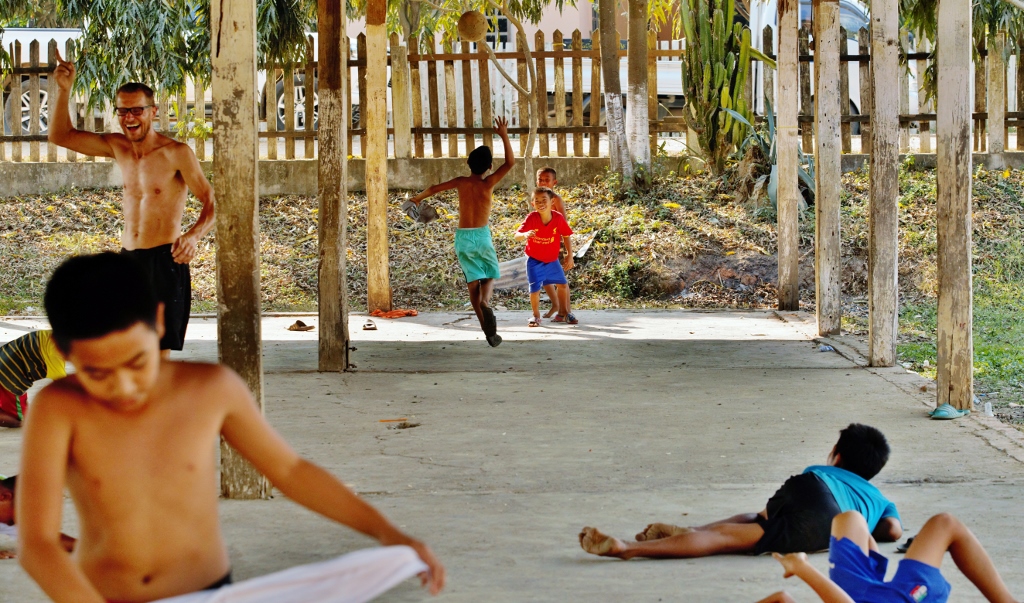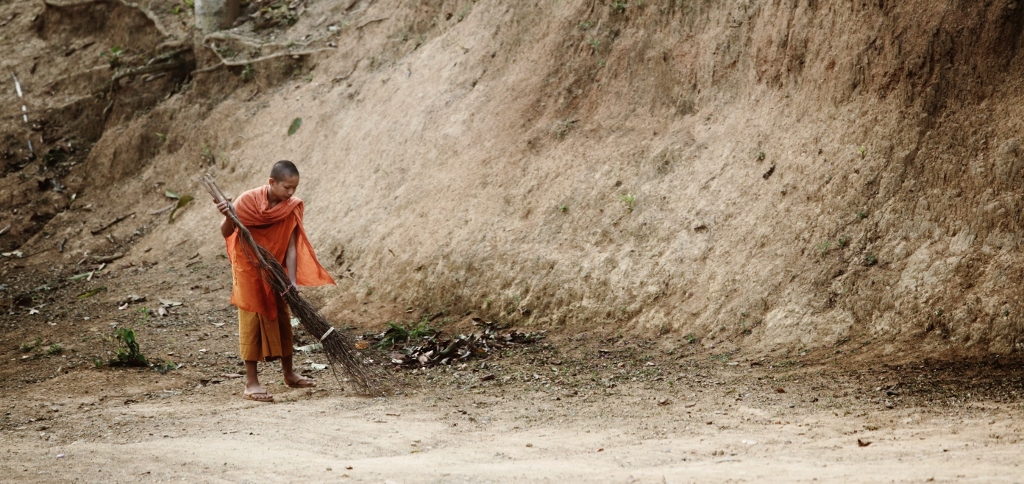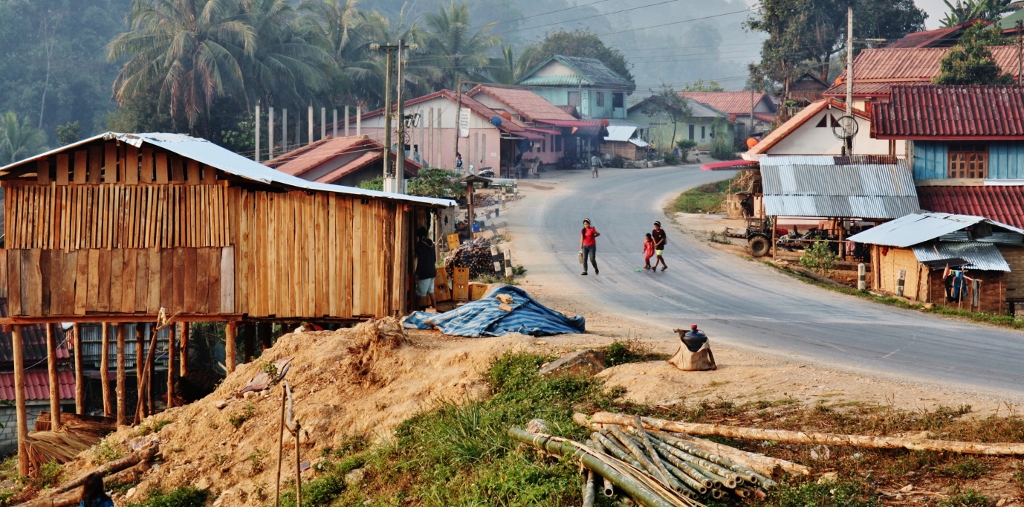Laos by bike part 2 from piotr strzezysz on Vimeo.
Tag Archives: Laos
Laos by bike
“Writing is, in the end, that oddest of anomalies: an intimate letter to a stranger” Pico Iyer
I have wrote recently that the traveling discourse is either an erotic discourse or none at all. But what if the road fails to delight us? Pass it over in silence? Stop writing? And why assume in advance that whilst travelling, we should marvel at any place, at any experience?
For over a month now, we have been wandering through Laos. It does not seem much, but it is quite a lot of time to get your own opinion about the place you visit. Of course, it will be very subjective and superficial opinion, relating to that sphere of experience, which remains the closest to our way of traveling, that is, to contacts with other human beings. Ladies and gentlemen, I shudder before writing this sentence, hardly persuading myself that someone cares about my opinion at all, but nevertheless I want to express that unfortunately Laos does not impress us at all.
“The abundance of races and languages is the richness given by God, a sign for those who think,” says the Koran. We don’t speak Laotian, neither do we know much about the Laotians themselves. Therefore, if we chose to visit that country, we would gladly learn something about it and try to see how people live in here. But in Laos, with a very few exceptions, almost no one wants to talk to us. We approach local people, greet them in Lao, saying sabaidee, but very rarely someone looks at us, seldom anyone answers.
Once we came to a wedding, but we did not spend a long time there. Once we were invited to school, and local children came closer to us a few times. And actually, that’s all.
That impression of certain emptiness or barrenness, not only on the social level, but also culinary one, we felt immediately after crossing the border, but we thought that apparently we expected too much instead of enjoying the very moment. But nevertheless, something is still missing.
Kids greet us every day, I can’t deny. They wave cheerfully, shouting phalang, phalang, white, white, but it is enough, however, to stop, and the kids run away. Adults, on the other hand, remain distant. So we approach them ourselves, but the distance does not change. The wall remains. Only red cats sometimes jump over it and spread out confidently on our laps.
Needless to say, the indifference of Lao people towards us has its advantages. We may put up the tent by the river or next to the school, being absolutely sure that no one will come quietly at night, no one will wakes us up, nor will disturb in any other way. But, apart from riding a bike, getting to know places, or admiring the landscape, we came here mostly to get to know people. We would like to talk to the Laotians from time to time, even if our mutual vocabulary would end up with a few words. We would like to do something together. Or do nothing. It would be enough just to sit in next to them, on a bench, to look at them and smile. Unfortunately, I regret to write it, but so far, our contacts with the Laotians have been based mainly on absence.
And yet, even in Lao there are moments, when all generalizations and presumptions fail. One may experience real explosions of delight, which sound like a shout after scoring the winning goal.
They said just one word: soccer. Actually, there were three words: soccer and fat boy, although the latter two did not refer to me, but to the only from the entire village obese boy.
The kids did not know where we came from. Poland did not seem to ring any bells neither in their ears nor their minds. They did not hear about Robert Lawandowski, but one more person was missing to the team – the fat boy would not play, anyway. Ana took the camera when I was running around on a roofed concrete square, trying to score the goal.
I never liked soccer. Neither as a player, nor as a fan. But this time I plunged into the game like a happy, innocent child. Maybe because I was doing quite well. And people rather like when they do something well. I would never have guessed that soccer connects people so much, and at the same time, it is able to boost someone’s self-esteem.
I was weak in dribbling, but I made up for it with my height and speed. When the score soared to 5:1, the kids from the opposing team began to lie on the concrete and moaned as if being in pain, pretending to be fouled when no foul has occurred.
One of the boys came closer and I was shown the red card, indicating that I was sent off the pitch. The boys from my team protested, but it did not help much. I left the field and then I got another card. A green one. What it meant, I have no idea.
We sat together on the grass. A few boys and a few girls. We talked with each other in our own languages. The words were rising, the bodies were swinging from smiles, the looks were colliding with each other in the air. It was difficult to keep up with everything.
They suggested going to the river, but we refused and went off to the city. Somehow it was sad to leave.
I do not know what we left behind. Maybe something, maybe nothing. However, it would be nice to think that we left something. That in that journey – which I often say is being done for nothing – maybe this game on the Lao concrete pitch carried some meaning. That it was for something.
Even if no one really knows for what.
Laos. Being in motion.
‘Standing there on the embankment, staring into the current, I realized that – in spite of all the risks involved – a thing in motion will always be better than a thing at rest; that change will always be a nobler thing than permanence; that that which is static will degenerate and decay, turn to ash, while that which is in motion is able to last for all eternity.’ Olga Tokarczuk Flights
Is it possible to write and talk about travel in an objective way? If one were to accept, apart from the degree of consciousness involvement, that being on the road amounts to collecting of impressions and gathering experiences, then any tone of the discourse concerning the journey must be reduced to the description of highly subjective experiences and emotions, indifferently – ecstatic, absolutely uninteresting or even dull. Though the latter, rather nobody will listen.
We’ve been in Laos for three weeks. We are not looking for anything particular here. Then, why you came here, someone maybe ask. A very good question, to which I cannot give any satisfactory answer. I would like to reply that ‘for nothing’, but I assume such a replica would not satisfy anyone. Maybe I will try to be a little more specific and I will add – ride a bike. We came here to ride a bicycle – it sounds the best explanation.
Perhaps it is a sort of infatuation. Not addiction, but infatuation. In traveling. And like every infatuation, it must be transparent.
Maybe we should travel in that way. Transparently. Trusting the inner voice of intuition. Forgetting what the road will bring. Without thinking what we will have to say, to show, or to gain from it. Even if the journey would become just ‘an eternal wandering after illusions, a constant desertion from the present’.
Let’s travel – by bicycle, by canoe, on foot, as we like. Let’s not have one vision of the world, one marked path, one proper version of traveling. And let’s talk about our travels. Those with or without purpose, short, long, distant, or close, with or without support, repeating to the boredom the phrase that traveling is like seeking a fairy tale.
Surely, we will not change the world. The world has to deal with more important problems and it does not care about our stories. But maybe thanks to our words, photos and emotions arousing thanks to them, albeit only for a moment, we will color someone’s dreams.

